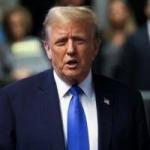Against UAP Disclosure?

In a recent Patheos post, “UAP Transparency Act?”, I relied on a diachronic assumption, namely, the U.S. government is resistant to disclosing any UAP information that might weaken national security. To date, congressional supporters of the UAP Transparency Act have not insisted that national security be sacrificed on behalf of UAP disclosure.
Here is a thesis to consider: within the UAP Disclosure movement certain bad actors — wannabe military contractors or international intelligence agencies — press for revelations of reverse engineered technologies useful for weapons manufacture and deployment. Why might we consider such a thesis?
For and Against UAP Disclosure
Since 2017, the pressure for UAP disclosure has increased dramatically in magnitude. Yes, Steven Greer’s notorious passion for disclosure continues with no flagging in zeal. But the new wave of disclosure lobbying — including congressional testimonies leading to federal legislation — have deluged us with both controversy and gravitas. The hue and cry is clear: tell us, Uncle Sam, what do you know about UAP?
As a discomfited futurist, let me imagine the following forecast: some disclosure advocates will attempt to break through the wall of national security secrecy in the name of UAP disclosure. Could we imagine that either spies or wannabe contractors would be so motivated to gain hitherto secret weapons technology that they might try to pry open Top-Secret vaults with a UAP crowbar?
To my knowledge this has not yet happened. So, this is speculation. Necessary precautionary speculation.
Science and the Freedom of Information Act
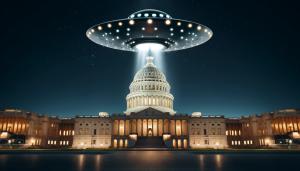
Why do ufologists cry out so loudly for disclosure? Because we want data for scientific investigation, data for what we now call “UAP Studies.”
“Unidentified flying objects do exist,” writes veteran ufologist Jacques Vallee. “They are astounding physical anomalies that have the ability to affect the perception of time and space and the consciousness of those who come close to them. They should be seriously and calmly investigated by the full power of science” (Vallee 2008, Kindle 3373).
The full power of science? Yes, indeed. But certainly, the full power of other disciplines as well. I put public theology on the list of research disciplines.
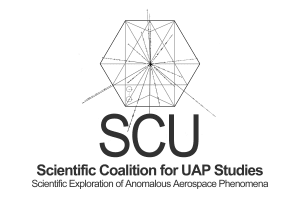
“The answer to the UFO phenomenon must come from the world of science and academia,” says physicist Robert Powell of the Scientific Coalition for UAP Studies (Powell 2024, 120). Powell and other researchers have benefitted from access to government repositories by invoking the Freedom of Information Act. Uncle Sam has coughed up data about UAP this way. The world needs all the Vallee’s and Powell’s we can get.
The thesis we debate here speculates that bad actors could infiltrate the UAP disclosure movement, drilling holes in the national security barrier in order to learn about reverse-engineered technologies useful in weapons development. How realistic is this scenario? We know that today’s weapons contractors already have security clearence above their military counterparts. Such technological knowledge is already secret. And contracters have access. So, does this count against our thesis?
Regardless, we need to ask: how could UAP disclosure take place without risking national security? On June 1, 2024, addressing the SCU conference in Huntsville, Alabama, UAP data specialist Doug Kimzey make it clear: “We will obey the law” and not mishandle any “classified material”!
Protecting National Security
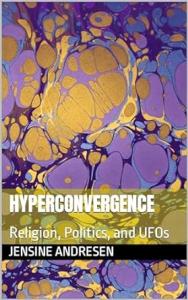
I like reading the published works of multidisciplinary scholar Dr. Jensine Andresen, who has published a number of books on ETI (extraterrestrial intelligence) and UAP (unidentified anomalous phenomena). During the 2023 debate in Washington over disclosure legislation, Doctor Andresen made clear her position: do not sacrifice national security on the altar of UAP disclosure.
“I do not support the proposed legislation because I think it compromises U.S. national security,” she wrote. Why might national security be at stake? Because it makes sensitive information regarding alien technology “available to spies” (Andresen, Hyperconvergenece: Religion, Politics, and UFOs 2023, 37, 61).
There be wisdom here.
Against UAP Disclosure to Protect National Security? No.
Certainly, national security is all too frequently used as an excuse to cover up what should be exposed to public scrutiny. Yes, there are abuses. Even so, national security still requires security. It requires an occasional red stamp reading, “Top Secret.”
But sharing this precautionary speculation is not intended to argue against UAP disclosure. Not in the least.
I’m grateful to Robert Powell and other ufologists who heroically knock on steel government doors with Freedom-of-Information battering rams.
SR 1184 UFO 14 Against UAP Disclosure?
UFOs and Aliens at the Vatican
Are UFOs our Celestial Saviors?
▓
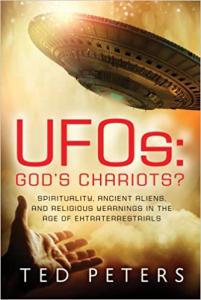
Ted Peters directs traffic at the intersection of science, religion, and ethics. Peters is an emeritus professor at the Graduate Theological Union, where he co-edits the journal, Theology and Science, with Robert John Russell on behalf of the Center for Theology and the Natural Sciences, in Berkeley, California, USA. Along with Martinez Hewlett, Joshua Moritz, and Robert John Russell, he co-edited, Astrotheology: Science and Theology Meet Extraterrestrial Intelligence (2018). Along with Octavio Chon Torres, Joseph Seckbach, and Russell Gordon, he co-edited, Astrobiology: Science, Ethics, and Public Policy (Scrivener 2021). Along with Arvin Gouw and Brian Patrick Green, he co-edited Religious Transhumanism and Its Critics (Lexington 2022).
Ted is former Louisiana State Director of MUFON investigations. He is also author of UFOs: God’s Chariots? Spirituality, Ancient Aliens, and Religious Yearnings in the Age of Extraterrestrials (Career Press New Page Books, 2014). See his website: TedsTimelyTake.com.
▓
References
Andresen, Jensine. 2023. Hyperconvergenece: Religion, Politics, and UFOs. Independent: https://www.goodreads.com/book/show/197292604-hyperconvergence.
Powell, Robert. 2024. UFOs: A Scientist Explains What we Know and Don’t Know. Lanham MD: Roman and Littlefield.
Vallee, Jacques. 2008. Revelations: Alien Contact and Human Deception. Kindle. San Antonio TX: Anomalist Books.




